by John Threlfall | Jul 6, 2015 | Alumni, Events, Graduate, Theatre, Writing
While students and alumni of the Department of Theatre tend to show up on stages all over—and far out of—town, one place to keep an eye on local talent is the Greater Victoria Shakespeare Festival. Running July 8 to August 8 and this year celebrating its 25th anniversary, the Shakespeare Festival is packed with Phoenix folks past and present, on stage and off.
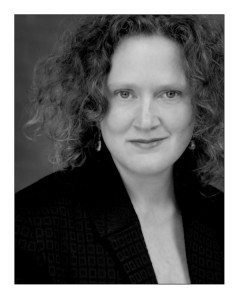
GVSS Artistic Director & Writing MFA Karen Lee Pickett
“We trace our genealogy back to 1991, when the first Shakespeare Festival was started in the Inner Harbour by Clayton Jevne,” says GVSS Artistic Director and local playwright Karen Lee Pickett—an MFA alumna of the Department of Writing. (Jevne himself was both an alumni and former instructor with the Department of Theatre.) “And after Clayton moved on, a couple of members wanted to keep it going so they formed the non-profit Greater Victoria Shakespeare Society and eventually found this home at Camosun College—and now it’s our tenth year at Camosun.”
This year’s outdoor productions include A Midsummer Night’s Dream—directed by Bard on the Beach’s Christopher Weddell—and Romeo & Juliet, directed by Phoenix alumna Britt Small, of Ride the Cyclone! and Atomic Vaudeville fame.
“Being the 25th anniversary, it’s good to have two plays with a broad appeal,” says Pickett, who was hired as festival producer back in 2011 and is now in her second year as Artistic Director/Producer. “The last time we did Dream was our first year at Camosun.”
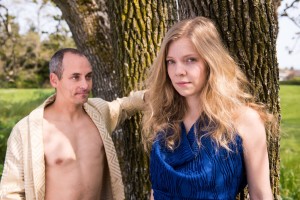
The triple Phoenix alumni Dream, starring Trevor Hinton (Oberon), Sarah Jane Pelzer (Titania) & directed by Britt Small (photo: David Bukach)
This year’s productions, running in repertory from July 8 to August 8 on the grounds of Camosun College—include Phoenix alum Trevor Hinton, Sarah Jane Pelzer, Cam Culham, Michelle Morris and Taylor Lewis, plus stage managers Rebecca Marchand and Delaney Tesch. And School of Music instructor Colleen Eccleston’s son Kiaran McMillan will be playing Romeo, as well as Lysander in Dream.
Pickett, who recently performed her own one-woman show Slick at Intrepid Theatre’s Uno Festival in May 2015,, admits her current gig is nominally a year-round position, despite being a summer festival. “It’s a lot for one person,” she says with a bit of a tired laugh. “My big push last year was to concentrate on the artistic quality of the productions. We have a great history of including a lot of students and community actors—which is an important part of our mandate—but I want to make the shows the best that we can make them.”

Phoenix alumna Sarah Jane Pelzer as Juliet with Kiaran McMillan as Romeo (photo: David Bukach)
As a playwright and actor herself, does being an artistic director help her own creative activity? “It’s challenging, especially with a small but growing organization, but I always feel grateful that I work in the arts; I don’t pull down any other jobs. That said, my hours are ‘when I’m awake.’ But living an artistic life means doing a lot of different things.”
Looking to the future, Pickett sees great opportunities for growth in the festival. “I really want to bring our young actors up through the ranks, so they have the opportunity to work with more established actors,” she says. “And I would like to expand our education program, so we can include more youth.”
The Greater Victoria Shakespeare Festival runs July 8 to August 8 at Camosun College. Tickets run from $19 to $24, or you can get a festival pass for $33 to $42.
by John Threlfall | Jun 15, 2015 | Alumni, Award, Events, Faculty, Theatre
When it comes to stage design, the Prague Quadrennial is as good as it gets—and this year, a pair of Theatre alumni will help represent Canada. “It’s the Venice Biennalie of stage design,” says Department of Theatre professor Allan Stichbury. “It’s the top in terms of recognizing stage design in the world.”
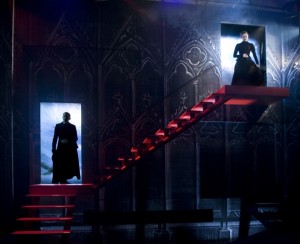
The nominated design for the Belfry Theatre production of The Turn of the Screw
With top stage designers from 80 countries, the Prague Quadrennial is the biggest theatre exhibition in the world. Canada will be represented by six different submissions at the June 18-28 event, selected from 33 entries by the three-person jury—which included Stichbury. Among those entries was the Belfry Theatre’s 2008 production of Turn of the Screw, which featured the design work of Phoenix alumni Patrick DuWors (set & lighting) and Erin MacKlem (costumes), plus frequent Phoenix contributor Brian Lynds (sound).
Much like any major international competition, the Canadian teams will be competing for gold, silver or bronze awards. Stichbury—who, along with Theatre professor Mary Kerr, has exhibited at the Prague Quadrennial before—will also be taking 13 current Phoenix students to the event.
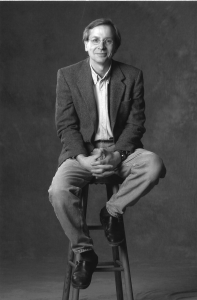
Allan Stichbury
“Our students have exhibited in the student exhibition since 1995—and they will again this year—but it’s not the same as being juried into the competition,” he notes. “But it’s still an amazing opportunity. The attendance is supposed to be about 80,000 people—and a huge percentage of that will be students, so our students get to meet colleagues from all over the world.”
As for the competition itself, Stichbury said the jury was obviously impressed by the stunning Belfry design by DuWors and Macklem. “It really met the criteria of inserting itself into the heart of the production—not just paying it lip service or commenting on it.”
Macklem, who graduated with a BFA in 1998, has been the Artistic Associate & Outreach Coordinator at the Belfry for nine years now and is “thrilled” at being selected. “The event itself is so inspiring—it gives you a sense of the national identity of the aesthetic of different places, and how the approaches to scenography vary according to geography.”
While she has attended the Quadrennial in the past (in fact, her
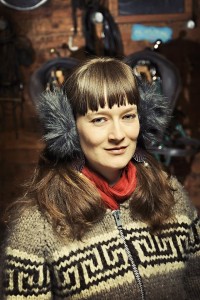
A stylish Erin Macklem
Turn of the Screw design was inspired by a Latvian entry she saw there), Macklem won’t be going this year due to family and production commitments. “I told Patrick that we’ll just have to work together on something exciting in the future so we get invited again,” she laughs.
Regarding the acclaimed design for Turn of the Screw, Macklem credits fellow Phoenix grad DuWors with the initial concept. “Patrick really took the lead on it with the idea of it being all black and white with a crazy modern red staircase,” she recalls.
“When I heard that he wanted a contemporary take on the Gothic period, I realized I wanted the costumes to key into the script and be true to period, so we didn’t go too far afield. The pieces themselves were very much from the period but they all had a satin contrast fabric sewn onto them so it would outline them and catch the lights in a certain way—the floor was also very high gloss, so we tried to incorporate the idea of light playing off the darkness.”
The very fact that the Belfry was mounting a Henry James piece originally written in 1898 also made the
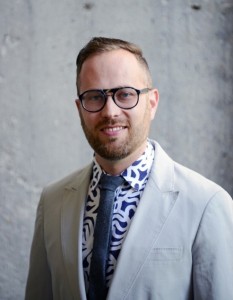
Patrick DuWors (photo: Jae Kyun Im)
production memorable for her. “The Belfry specializes in contemporary shows, so doing a Henry James piece was weird and outside of the mandate, even though it was a modern adaptation of the script,” she says. “To approach it with a very contemporary eye to the design made it feel like it was more a part of the world the Belfry’s audience was accustomed to. People still say, ‘what was that one with the crazy red staircase?’ It’s fun that it left that much of an impression on people’s imagination.”
Macklem is also quick to credit her UVic training for her current success. “I had a great experience with the design department,” she says, citing Mary Kerr, past instructor Debra Hansen and Stichbury himself. “Allan is very much a director’s designer, which put me in good standing and helped me understand how bodies move through space, how you really need to analyze a play’s text to understand the traffic patterns—what the positions of power are and how to optimize those in the design.”
She also notes how the variety of design experience at UVic better prepared her for future employment. “I did more set design in school but there were more opportunities in costume design out of school, so I switched to that,” she explains. “But I had the advantage of both Mary Kerr and Debra Hansen alternating in the teaching position, so it was great to have different perspectives from different teachers.”
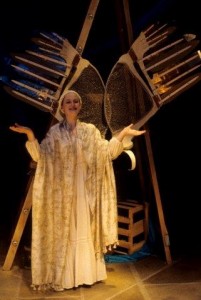
Macklem’s design work for Eleemosynary at the Phoenix
When asked for a standout production from her student years, Macklem points to the 1997 Phoenix show Eleemosynary. “It was all-student design, and we were all undergrads, which was quite rare,” she explains. “It was really quite a utopian experience—we were all on the same page—and that really came though in the design. It showed all of us how you can transform a theatre, take the set off the stage and into the audience and how much that can change things.”
Stichbury notes that it’s the Department of Theatre’s unique hands-on approach that makes it outstanding in a crowded university field. “Unlike many Canadian universities, our students actually get to design something and put it on a stage,” he explains. “At the undergrad level, most universities have faculty members exclusively designing, but we allow our best undergraduates to do it—so when they get out into the profession they’re much more capable of stepping up at an earlier date than many others. They learn by doing—don’t get me wrong: learning by theory is great, but you also have to practice. Our students get more opportunity to do that on a significant scale than most do.”
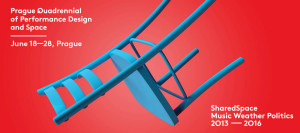 Ultimately, Stichbury already sees both Turn of the Screw and UVic as winners in this year’s Prague Quadrennial. “It’s fantastic that UVic is represented in at least one of the six shows,” he says. “It’s already a big victory, because there’s a lot of pretty amazing stuff out there across Canada.”
Ultimately, Stichbury already sees both Turn of the Screw and UVic as winners in this year’s Prague Quadrennial. “It’s fantastic that UVic is represented in at least one of the six shows,” he says. “It’s already a big victory, because there’s a lot of pretty amazing stuff out there across Canada.”
by John Threlfall | Jun 11, 2015 | Alumni, Award, School of Music
When it comes to academic achievement, good things often come in quiet packages. Consider the case of graduating School of Music student Spencer Davis, who has been named the recipient of the 2015 Victoria Medal—awarded annually to the student with the highest GPA in the Faculty of Fine Arts—thanks to his impressive graduating average of 8.94. Yet as one of his instructors notes after four years of working together, “I had no idea what kind of a player he would be because he is so unassuming.”
“This is a great honour, and one for which he obviously had to work tremendously hard,” notes Acting Dean Lynne Van Luven. “I congratulate Spencer on this wonderful cap to his Bachelor of Music career.” Davis graduates on June 11, along with the rest of the Fine Arts class of 2015.
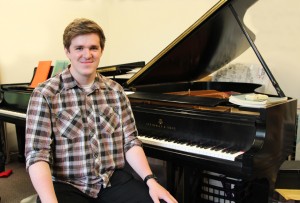
2015 Victoria Medal winner Spencer Davis
Vancouver-born but Calgary raised, Davis returned to the coast to attend UVic. “I auditioned for, and was accepted at, a few other schools but I chose to attend UVic because of the distinct friendliness I experienced from the students and faculty during my audition. I’ve had a great experience at UVic, and I’m glad that I chose to come here.”
When it comes to achieving such a remarkable GPA, Davis puts it down to the fact that he worked “tremendously hard.” “I prioritized school above everything else in my life, and I focused all of my energy on it.” Not that he feels this puts him above his peers. “I have friends who did the same, and I feel strongly that they are just as deserving of this award as I am.”
“Spencer [is] as a musician and performer of the highest caliber,” notes School of Music director Susan Lewis. “He gave major solo performances and collaborative recitals, culminating in a graduating recital featuring music by Debussy, Beethoven, and Chopin.”
You can listen to his graduation recital here, which features Davis performing Debussy’s “Suite Bergamasque,” Beethoven’s “Bagatelles, Op 126,” Chopin’s “Mazurkas, Op 24 Nos 3 & 4” and “Sonata No 3 in B Minor,” as well as some of his other performances.
But the soft-spoken Davis downplays his academic accomplishments (“To be honest, receiving this award feels like my greatest achievement here,” he says), calling his solo graduation recital “an incredibly daunting challenge—and one of the most character-building experiences of my life.”

Bruce Vogt
Describing him as “a quiet-spoken young man who would always come to his lessons with very particular ideas about interpretation,” supervising professor Bruce Vogt calls Davis “a special talent . . . I never had to push him or remind him that things were behind. He basically was taking almost the equivalent of two degrees, and yet he kept the highest standards in everything. He is indeed a special student—thoughtful, compassionate and extremely intelligent.”
Beyond performance, the other of those “two degrees” came about as a result of Davis taking professor Andrew Schloss’ “Music, Science & Computers” course. “It introduced me to new ways of thinking about music and sound, and stoked my interest in music technology,” Davis recalls. “It also got me interested in studying math and science, at which I had excelled in high school, but for which I had never felt any passion.”
Following Schloss’ class, Davis swiftly registered in two introductory computer science courses. “At this point, I knew I wanted to pursue my new interest academically, but also felt driven to finish my music degree, so I supplemented my music courses with courses from the software engineering program, applied for it, and was accepted,” he says. “I’ve long had an interest in electronic music, and am well-acquainted with modern digital audio tools. It’s my hope that I’ll be able to draw on my background as a musician and performer to create new kinds of tools for digital audio that are less restrictive and more intuitive.”
With his departure from the School of Music, Davis singles out piano professor Bruce Vogt. “I should take this opportunity to thank Bruce Vogt, with whom I have worked closely for the past four years, and for whom I have a great deal of respect. I’ve learned a lot from him, and he has had a really positive influence on me personally and artistically.”
As for the future, Davis says he hopes to find an occupation that “capitalizes as fully as possible on my unique set of aptitudes, and on what will be, at the close of my time at UVic, my unusual and diverse educational background.”
Curious who else has won the Victoria Medal? Read about such diverse winners as Art History & Visual Studies architectural student Genevieve Neelin, Department of Writing poet Kyeren Regehr, and Art History honours student Regan Shrumm.
by John Threlfall | May 20, 2015 | Alumni, Award, Events, Faculty, Research, Writing
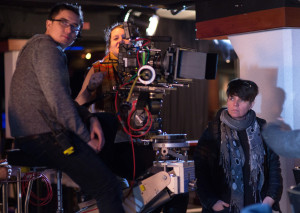
Bradley on the set of Two 4 One (photo: Arnold Lim)
Need proof of the impact of the Department of Writing‘s film production courses? Just look to the 2015 Leo Award nominations, where films by Writing faculty and alumni received a combined 26 nominations—a staggering number for a university that doesn’t technically have a film production program.
Clearly, the Writing department is punching above its weight when it comes to film futures, but this year’s list of nominees is no exception—as evidenced by past Leo nominations and the department’s 2011 win for Best Web Series Award for Freshman’s Wharf.
What’s the secret to their success? “Film is just a development of the Writing department’s already well-known streams: fiction, poetry, creative non-fiction and drama,” says film professor Maureen Bradley. “I don’t know anywhere else in the country where this is happening. There are good student films being made, but they’re not being driven by faculty [led-courses].”
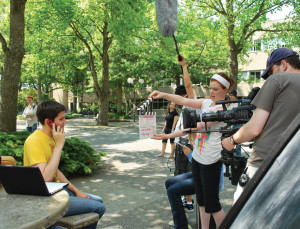
Students shooting Freshman’s Wharf on campus
Bradley has spent the past five years building up the technical equipment and supporting talent to create professional-looking 10-minute short student films. “Drama and film are really an applied form of learning,” she explains. “A screenplay and a play are not final products, and they’re always open to interpretation. Students need to see how hard it is to make a film, how to adjust the writing as the film is made, how to write with a budget in mind.”
With no other Vancouver Island college or university offering film production classes, Bradley feels UVic’s Writing department is uniquely situated to help fill a gap both locally and nationally. “I think we have the best [student] screenwriters in Canada here, and I have a lot of experience in the other centres,” she says. “This is a unique situation where the production comes through the writing first. I’ve seen beautiful films at student screenings across Canada, but the story is usually lacking—so it’s really exciting to see story and surface come together here. Why make a film if there’s no heart to it?”

Blackfly
This year’s Leo nominees with ties to the Writing department include:
• Alumnus Jason Bourque‘s feature film Blackfly leads the pack with nominations for 10 awards, including best motion picture, direction & screenwriting
• Professor Maureen Bradley‘s feature film Two 4 One (produced by Fine Arts Digital Media Technician Daniel Hogg) is nominated for six awards, also including best motion picture, direction & screenwriting—and costumes, which were created by Theatre grad Kat Jeffery

Gord’s Brother
• The short film Gord’s Brother—created by the busy alumni team of Daniel Hogg (producer), Jeremy Lutter (director) & Ben Rollo (writer)—received four nominations
• Alumni Kate Bateman & Matt Hamilton‘s web series The Actress Diaries received four nominations
• Recent MFA grad Connor Gaston‘s student film Godhead received 2 nominations
A project of Motion Picture Arts & Sciences Foundation of British
Columbia since 1999, the Leo Awards are an annual celebration of excellence in BC’s film & television scene.
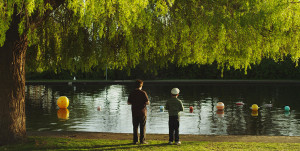
Godhead
The awards will be presented over three evenings in Vancouver, depending on program: June 6 at the Westin Bayshore and June 13 & 14 at the Hotel Vancouver.
by John Threlfall | Apr 21, 2015 | Alumni, Events, Graduate, Theatre, Writing
When it comes to their theses, UVic’s graduate students are always looking for something new. Recently, Master of Education student Mike Irvine became the first person to conduct an underwater webcast defence of his thesis. Now, Department of Writing MFA candidate and playwright Leah Callen will present a staged reading of her thesis—the surreal play Enter Vodka—followed by a public defence . . . in front of a live audience.

Dept of Writing MFA Leah Callen
“Originally, I asked to do my defence under-vodka, but that was a no-go,” quips Callen. “I’m just grateful for the opportunity to have my play read by some lovely actors to an audience. A script doesn’t mean much unless it is heard out loud.”
Enter Vodka marries the personal histories of two dead Russians—Stalin’s daughter and the Romanov Princess Anastasia—both stuck at 17, and trapped inside a melting Fabrage egg. In Enter Vodka, nothing is as red or white as it seems. The 90-minute show begins at 8pm Sunday, April 26, at the Intrepid Theatre Club (1609 Blanshard, at Fisgard) with Callen’s thesis defence to follow. Admission is by donation.
The staged reading—directed by Melissa Taylor, featuring Kathleen O’Reilly & Julie Forrest, and designed by Kerri Flannigan & Colette Habel (all UVic students or alumni)—is part of Intrepid’s monthly New Play Reading Series and in support of the Equity in Theatre Initiative, which continues to celebrate the work of local women playwrights at all stages of their careers. “We are happy to be working with the UVic writing program on this project to bring new plays to life,” says Intrepid artistic director, playwright and celebrated Department of Theatre alumna Janet Munsil.
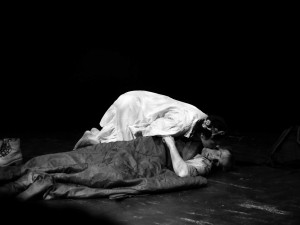
A scene from Callen’s The Daughter of Turpentine
Nervousness aside, Callen is looking forward to the opportunity of having her new play presented in public. “UVic’s Writing program is wonderful, but I felt pretty cloistered as a playwriting graduate student, typing away by myself for two years,” she says. “I’m both excited and terrified by the defence part—but if I can’t stand up to a little public scrutiny, what kind of a playwright am I? My characters have to go through the fire literally, so the least I can do is honour them figuratively with a little Q&A.”
The idea behind the public defence came from Callen’s MFA supervisor—award-winning playwright and Writing professor Kevin Kerr—who wanted her project to step off the page. “A stage play is meant to be seen in performance and, as a writer, it’s important to see the work handled by the other collaborating theatre artists who bring the work to life,” he explains. “The success of the thesis is not only on the page, but also in the way that it inspires other artists to create a living experience for an audience.”

Writing professor & playwright Kevin Kerr
Kerr feels this is an ideal opportunity to showcase the creative academic process. “It seemed to be an exciting way to handle this formal step in Leah’s academic journey,” he says. “It’s potentially an opportunity for an audience to get a first-hand encounter with what a Fine Arts graduate degree entails, and demonstrates the connection between the work done inside a university Fine Arts program and the professional practice the students are working towards.”
Both Kerr and Callen expect it to be more than just a standard theatrical talk-back session. “There will be a different level of stakes attached to the process, as the questions—and answers—are part of the final step for Leah to complete her MFA,” he says. “People witnessing the defence will also be able to contribute to that experience with questions of their own.”
Not that Kerr is out to add extra pressure to an already daunting experience. “Will it be nerve-wracking? Yes—but exciting as well,” he chuckles. “Leah is being supported by a team of artists who are invested in presenting the work to the best of their abilities. Their passion is already a vote of confidence in the candidate’s talent and ability, so Leah’s not alone in this experience.”
Callen—who spent the past two years studying with playwriting faculty Kerr and Joan MacLeod—had her first one-act play, The Daughter of Turpentine, produced by Phoenix Theatre’s SATCo in 2014. She has also reviewed theatre for local online magazines Coastal Spectator and CVV Magazine. A revamped version of Turpentine will reemerge as a full production at the Victoria Fringe Festival in August this year; directed by Phoenix Theatre’s Chase Hiebert, Callen promises it will “literally set the stage on fire.”
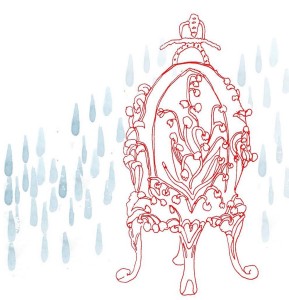 The inspiration for Enter Vodka originally came from a poem she wrote about the Romanovs for Writing professor Tim Lilburn’s poetry workshop. “This story is inspired by the two real women, but it’s a metaphor for the places people visit when wounded, to escape or revisit pain in ways that are as ritualistic as drinking tea, lighting candles or doing shots of vodka,” explains Callen, who cites the likes of Tennessee Williams, Tomson Highway, Sarah Ruhl, and Wajdi Mouawad as influences.
The inspiration for Enter Vodka originally came from a poem she wrote about the Romanovs for Writing professor Tim Lilburn’s poetry workshop. “This story is inspired by the two real women, but it’s a metaphor for the places people visit when wounded, to escape or revisit pain in ways that are as ritualistic as drinking tea, lighting candles or doing shots of vodka,” explains Callen, who cites the likes of Tennessee Williams, Tomson Highway, Sarah Ruhl, and Wajdi Mouawad as influences.
“Anastasia ordering Svetlana about could easily be modern-day Russia trying to drag Ukraine back home. I’m playing with the historical forces that have led to this moment in time, and in the end their holy kiss has explosive repercussions literally and figuratively. But this is not a biographical play. It is symbolic and thematic of the Russian struggle, but it’s mostly about women trying to find joy and freedom in the face of death.”
Kerr is also looking at this as something of a pilot project. “I’d be interested in continuing to find more opportunities to connect our grad students to the larger theatre community and audience as part of their time here,” he says. “I think it could be an important part of what we can offer as a program.”
by John Threlfall | Apr 2, 2015 | Alumni, Faculty, Graduate, Theatre
Hot on the heels of their critically acclaimed (and commercially successful) 2014-15 season, Phoenix Theatre recently announced their lineup for next year. A mix of new work, old classics and rarely seen gems, the 2015-16 season is looking like another great year.
“Theatre has a way of reminding us what it means to be human,” says Theatre department chair Allana Lindgren. “At the heart of the Phoenix Theatre’s 2015/16 season are four plays that share compelling human stories, and with master playwrights like Bertolt Brecht, Anton Chekhov and Tennessee Williams in this list, I know you’ll love the plays we’ve chosen for next season.” Here’s what’s coming up:
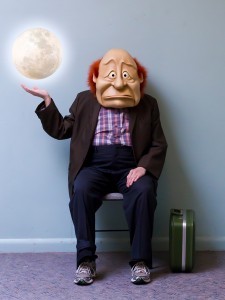
Loon by the WONDERHEADS (photo: Andrew Phoenix)
Opening the season with their traditional Spotlight on Alumni, Phoenix alumna Kate Braidwood returns to campus with her performance partner Andrew Phoenix and their widely acclaimed WONDERHEADS company. They’ll be presenting the wordless and whimsical Loon (October 14-24), a beautifully surprising mix of physical theatre, comedy and pathos and a love story the likes of which you’ve never seen. CBC enthusiastically described Loon as “a live cartoon for lovers and for dreamers; that is, for everyone. I’d give it more than five stars—I’d give it the moon.”
Loon centers on Francis, a lonely janitor who is plagued by isolation and tickled by whispers of childhood imagination. He has hit rock bottom and discovers that he has nowhere to go . . . but up. And up. And up! But will plucking the moon from the sky bring him the love he is searching for? The Portland-based WONDERHEADS have been hits with every show they’ve brought to town (including Fringe Fest favourites Grim & Fischer and The Middle of Everywhere) and it’ll be a pleasure to see Braidwood back at the Phoenix in the Spotlight on Alumni.
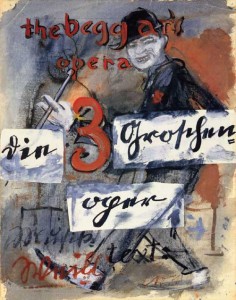
A German poster for The Threepenny Opera circa 1928
Up next is Bertolt Brecht’s classic The Threepenny Opera (November 5-21), featuring the music of Kurt Weill—possibly best known for bringing the jazz standard “Mack the Knife” into the world. Directed by Theatre professor Brian Richmond, The Threepenny Opera borrows from the 18th-century The Beggar’s Opera and offers an edgy mix of biting satire and sheer theatrical innovation as it takes aim at the traditional bourgeoisie and reveals a society where law is fickle, money corrupts and crime absolutely pays.
“This is quite possibly the most important piece of musical theatre in the 20th century,” says Richmond, who will be working with Applied Theatre professor Kirsten Sadeghi-Yekta to bring a strong sense of realism to this production. Richmond is well-known for breathing fresh life into classic works, as evidenced by past Phoenix productions like Guys & Dolls, Dark of the Moon, The Wind in the Willows and Romeo & Juliet.

Renoir’s 1881 painting “Le Déjeuner des Canotiers” catches the flavour of Wild Honey
Moving into 2016, we have Michael Frayn’s Wild Honey (February 11-20). Directed by Theatre professor and Phoenix alumnus Peter McGuire, and adapted from an original play by Anton Chekhov, Wild Honey offers a charming and hilarious love triangle set on a hot summer day on a provincial country estate, where friends, neighbours and family all get caught up in an elaborate game of romantic cat-and-mouse.
“Shakespeare said, ‘what fools these mortals be’ and I want to celebrate that sense of foolishness,” says McGuire, noting that Wild Honey is a lot like “a Woody Allen film—it shows us lives filled with love, sex and intrigue, all with a strong element of farce.” McGuire also plans to take a decidedly non-traditional approach to the production, with the design mixing old and new, classic and modern—all to a jazzy, klezmeriffic music score. Curiously, Wild Honey is based on Chekhov’s first ever play, which was then sealed in a bank vault until after his death.

Summer and Smoke is evoked in Richard Emil Miller’s 1910 painting “The Pool”
Finally, Phoenix ends its season with Tennessee Williams’ Summer and Smoke, as directed by MFA candidate Alan Brodie (March 10-19). Set in Mississippi at the turn of the 20th century, Summer and Smoke sees Tennessee Williams at his most passionate as he gives us the tale of Alma—the daughter of a small-town minister and mentally unstable mother, who harbours a life-long infatuation with her restless and self-indulgent neighbour, John. Of course, Alma and John’s struggle—between body and soul, anarchy and order, love and lust—leads to profound changes in both their lives.
“As a designer, I’ve done plenty of shows but hardly any from the modern American milieu,” says director Brodie. “I’ve always been drawn to early 20th century playwrights like Williams, who emphasize story, character and psychology. This is essentially a love story, just one without a happy ending.” (Better get out your handkerchiefs for this one.)
A bittersweet exploration of love and longing, Summer and Smoke is a true American masterpiece with unforgettable characters that break our hearts even as they touch our souls.
Click here for ticket information, and subscriptions for the 2015-16 season are already on sale here.
























